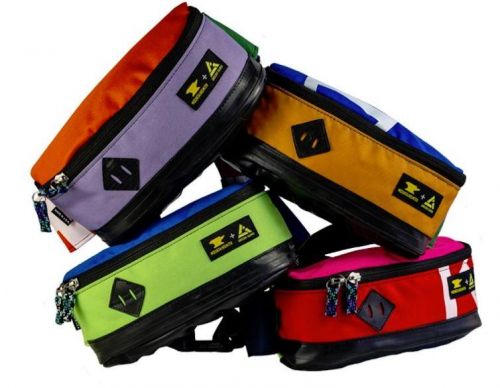By John McCurry
BOULDER, Colo. (BRAIN) — Green Guru Gear has combined upcycling with bicycling for the past dozen years.
The Boulder company has diverted an estimated 1.25 million pounds of used bicycle tubes from landfills since its founding in 2007 and turned them into attractive, functional bike-related gear, sold through some of the same shops that kept the tubes out of the trash. As company founder and president Davidson Lewis tells it, Green Guru’s niche is providing something a little different for discerning bicyclists.
Lewis came to Colorado in the early 2000s, armed with a degree in industrial engineering from Virginia Tech. After working in design and development roles with several firms in the outdoor industry, he founded Green Guru.
“It was essentially born out of me having worked at bicycle shops growing up and being tired of throwing away bicycle tubes. Fixing flats all day long, I saw a lot of tubes get thrown away.”
Green Guru’s headquarters, which houses design, sales and marketing functions, also serves as a collection point for its raw materials, which include tubes, old wetsuits, tents and discarded vinyl banners. These mostly post-consumer products are then transported to Green Guru’s small factory in nearby Longmont, where employees clean, cut and sew them into an array of products.
Continuing Green Guru’s idiosyncratic theme, Lewis recently purchased a vintage Airstream travel trailer he plans to convert into a design studio. Green Guru offers nearly 50 SKUs — panniers, backpacks, hip packs, an assortment of zipper pouches, wallets and travel kits. Green Guru’s retail channels include bike shops and outfitters. The company also sells directly to consumers from its website, which Lewis says has been successful. A small number of products are sold on Amazon.
“We are considered the most eco-friendly bike product company in the world, but it’s very niche.” — Davidson Lewis
Lewis describes customers as eco-minded cyclists looking for something unique. Green Guru tends to attract a utilitarian, casual group of riders as opposed to the “uber-competitive, carbon-fiber crowd.” He hopes to broaden his customer mix to include other areas of outdoor enthusiasts who fancy sustainable products.
Lewis said many IBDs are increasingly tied to major bike brands and those brands’ accessories, leaving little opening for Green Guru. As a result, wholesale business is down slightly, but direct-to-consumer business is up substantially.
 “We are considered the most eco-friendly bike product company in the world, but it’s very niche,” Lewis said. “The hip packs we launched with REI and the backpacks we are showing at Outdoor Retailer are broadening our category a bit, which is nice.”
“We are considered the most eco-friendly bike product company in the world, but it’s very niche,” Lewis said. “The hip packs we launched with REI and the backpacks we are showing at Outdoor Retailer are broadening our category a bit, which is nice.”
Three years ago, Green Guru’s parent company, Eco Brands Group, acquired its major competitor, Seattle-based Alchemy Goods, a brand known for more fashion-oriented upcycled products. A third company in the group, Ecologic Designs, focuses on business-to-business operations and has developed promotional products for AT&T, Patagonia and other companies.
“When a corporation wants a lot of bags for a conference or event, we do it through our Ecologic Designs division,” Lewis said. “We can make products such as tote bags, lanyards and badge holders designed around the company’s materials. For the AT&T project, they sent us 1,000 yards of banners. We made 1,000 backpacks, which AT&T then donated to children in need.”
A steady stream of raw materials is available — U.S. shops accumulate a lot of old tubes.
“A bike shop will fill up with old tubes during their active season, accumulating 100 tubes or so in a month,” Lewis estimates. “So multiply that by all of the bike shops. We are only collecting a few percent of that. But the more we grow, the more material we are able to divert.”
Lewis would like to add more material streams to his supply chain.
“Every couple of years we add another material, and it tends to be something around gear waste,” he said. “We’re often asked what we can do with shoes or clothing, but that tends to be tough because of all the seams, pieces and parts. We will probably expand our products into the general backpack category, growing outside of bike products to general users who appreciate the functionality and design of the products.”
Lewis said Green Guru has been a fun venture. He enjoys riding his bike to work and grabbing a beer at the Spoke and Wheel, a microbrewery that shares space with the company in a business park east of downtown Boulder. Green Guru also shares space with a bike shop that focuses on cargo bikes.
Lewis enjoys the reaction his brand receives from people.
“I really like people coming up and thanking us for what we do,” he said. “They might not even be customers, but they are grateful we are looking for solutions and making stuff in the USA.”
A version of this article appeared in the July 1, 2019 issue of BRAIN.


